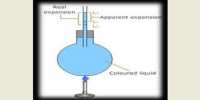Matter can exist in three states e.g. solid, liquid and gas. All of us know that water has three states-ice, water and vapor. These three states are called solid, liquid and gas. These states of water depend on air pressure and temperature.
A solid may be liquefied by applying heat. This process is called fusion. At the beginning the temperature of a body rises with the application of heat and at one stage the temperature does not change even if more heat is applied. At this moment the amount of heat absorbed by a body is used to convert the solid into liquid only. If heat is applied to ice below 0°C, temperature will rise and reach at 0°C. After this if more heat is applied the temperature will not rise but the ice will begin to melt to water.
The amount of heat absorbed during the conversion of a solid to liquid is used to break the inter molecular bond of the molecules. On further heating the temperature of water of 0°C starts to rise. At a stage, water starts vaporizing and the temperature remains unchanged. During this time water absorbs heat to become vapor.
Here also the effect of heat is used to break the inter molecular bond among the liquid molecules. On the other way around, gaseous substance may be converted to liquid and liquid to solid by extracting heat from them. So, on the transformation of substances effect of heat is remarkable.














